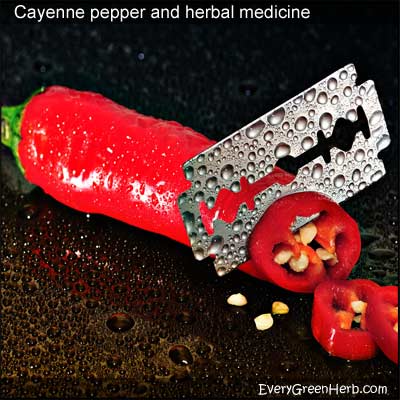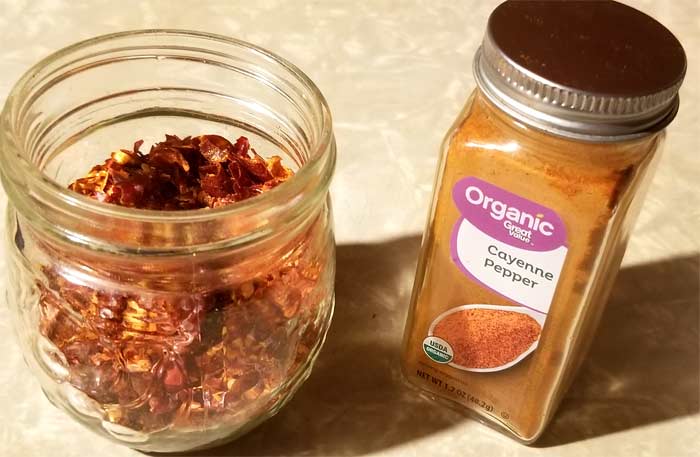Cayenne in herbal medicine
Cayenne pepper (Capsicum annuum) can be found in many kitchens since it adds spicy heat to everything from salsa to chocolate.
Did you know that cayenne pepper is valued by cooks and herbalists? Cayenne has been used for centuries to flavor food, and to treat a variety of health problems.

Want to try herbal medicine? Start with familiar things like hot peppers!
Cayenne, the red powder people sprinkle on pizza, is a circulatory stimulant that promotes sweating. It is also antiseptic, antibacterial, and a nerve tonic.
Used topically on the skin, cayenne increases blood flow to the area and counteracts conditions such as shingles.
Cayenne is considered an herbal catalyst. When a pinch of cayenne powder is added to any herbal tea, it increases the effectiveness.

Capsicum is a natural remedy.
The active ingredient in cayenne pepper is called capsicum. Capsicum increases appetite and helps fight colds, sinus problems, the flu, chills, heart disease, psoriasis, obesity, headache, hoarseness, and other throat problems.
Capsicum also helps stop itching and eases pain naturally.
How does cayenne work?
Capsicum relieves pain and itching by acting on sensory nerves, internally and externally. Using capsicum leads to a temporary depletion of neurotransmitters so pain signals can no longer be sent.
Capsicum also reduces platelet stickiness and is often used as a circulatory tonic.
Capsicum has an energizing effect on the entire body. It has traditionally been used for overcoming fatigue and restoring stamina.
Some herbalists consider cayenne peppers to be one of the most useful herbal remedies known to man.

Many uses for cayenne
Powdered cayenne pepper can be added to herbal gargles for sore throat.
It also makes a fine compress when applied to sprains and bruises. Do not leave on for too long. Remove compresses after five minutes.
Cayenne is often added to massage oils, creams, and lotions for use in natural treatments of arthritis, rheumatism, shingles, psoriasis, other skin problems, and eczema.
Cayenne and other hot peppers increase the flow of stomach secretions that are needed to break down proteins and fat. Cayenne can greatly benefit the digestion and is known to help ease stomach cramps and gas.
Read about making your own herbal products at home.

Always test on a small area before using on skin.
You can add cayenne powder to lotions and creams. Add enough so that your cream becomes light pink in color.
People with sensitive skin should use gloves when applying or handling any hot pepper product.
Always test on a small area before using on larger area and remove the seeds before use.
Cayenne helps protect against frostbite.
Cayenne pepper works both internally and externally in colder climates to protect against frostbite. It is usually taken as a tea to increase body temperature and to increase circulation to the extremities.
Scientific studies
Studies show that cayenne has the ability to hinder plaque formation in the blood vessels and raise metabolic rates in muscle tissue.
The antioxidants in cayenne can help treat fatty liver disease, diabetes, obesity, and hypertension.
A recent analysis of studies done in Korea and Mexico concludes that moderate daily intake of hot peppers can significantly reduce gastric cancer risks, although heavy daily consumption may raise risks. More research is needed.
Studies also show that cayenne can decrease cholesterol and triglyceride levels by reducing absorption and increasing excretion via the bowels.
Foods containing hot pepper increase fat oxidation and help to burn calories at a faster rate. They also increase body and skin temperature slightly, and decrease the sensations of hunger. This is good new for anyone that needs to lose weight and get cholesterol levels under control.
Top 3 Benefits of Cayenne Pepper
In this YouTube video, Cynthia Sumner talks more about the health benefits of cayenne.
Cayenne in the kitchen
Cayenne is no stranger in the kitchen and gives a kick to bland foods. It is even added to desserts! Cayenne makes an interesting addition to hot chocolate, cookies, and cake.
A long history
American Indians have used cayenne for thousands of years. They used it as a food and for pain relief.
It has been used as an herbal medicine by many cultures including Asia, China, Italy, and Mexico for treating the stomach, poor appetite, arthritis pain, sore muscles, and circulatory problems.
Cayenne pepper plants require warm weather.
Cayenne pepper is originally from South America and is related to bell peppers and jalapenos. Cayenne peppers plants prefer warm, moist, nutrient-rich soil and a warm climate.
The plants reach a height of about 3 feet and have attractive, dark green leaves. They thrive in tropical regions, however they do just fine when grown as annuals in temperate climates.
Peppers prefer full sun. They cannot tolerate frost and seeds are usually started indoors to get a head start on the weather.
*To remove cayenne from the skin, use a vinegar wash. Cayenne does not dissolve in water. If you get a burning sensation after eating cayenne, drink milk or eat yogurt.
Do not use cayenne on broken skin or with a heating pad. Do not get cayenne near the eyes or other sensitive areas. Always test a small area of skin before applying any herbal product to a large area. Leave on overnight and check for irritation before resuming use.
Cayenne may irritate the digestive system if taken on an empty stomach. Excessive use can lead to liver damage.
Always consult with a healthcare professional before using any herbal remedy especially if pregnant, nursing, or taking other medications.
Sources:
https://www.mountsinai.org/health-library/herb/cayenne
https://www.ncbi.nlm.nih.gov/pmc/articles/PMC4477151/
https://www.ncbi.nlm.nih.gov/pmc/articles/PMC6000222/
Blessings to you and yours!
Thanks so much for reading my blog. Jan.

*Note - the information on this website has not been evaluated by the Food and Drug Administration.
© 2005-2024 website design and content by Janice Boling